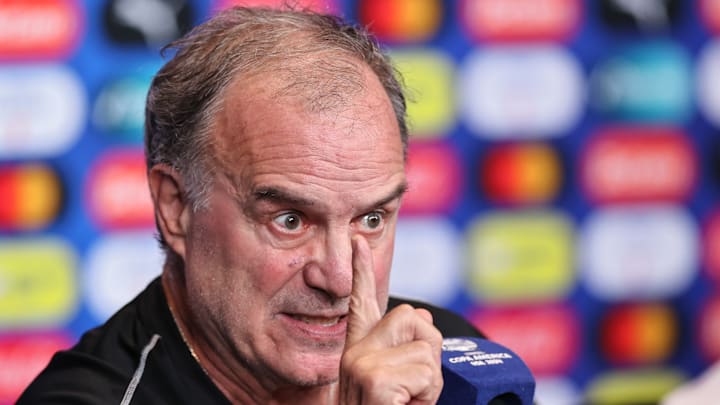The 2024 Copa America, which is heading towards its grand final, was the scene of an explosive outburst from Uruguay coach Marcelo Bielsa. Known as "Loco" Bielsa, he didn't mince words when criticizing the organization of the tournament during a press conference ahead of the third-place match against Canada. According to Bielsa, there is a climate of retaliation against any criticism directed at the organizers of the tournament in the United States.
Follow MLS Multiplex on X (Twitter).
The situation couldn't be more tense. The semi-final loss to Colombia was still on everyone's minds, but Bielsa went beyond the fights on the pitch. He accused the organizers of lying about the quality of the pitches and threatening those who dared to speak the truth. "El Loco" also mentioned the criticism of Lionel Scaloni, Argentina's coach, and Vinicius Jr., star of the Brazilian national team, about the inadequate conditions of the pitches.
Bielsa didn't mince his words: "Just so you remember, the United States, when it felt that its interests were being attacked, created 'Fifa Gate' with the FBI. They did what they did, but it was only out of self-interest. Nothing happened here," he said. He also commented on the supposed "extraordinary celebration" of the Copa América, with packed stadiums and efficient refereeing, but pointed out that the pitches were far from perfect. "They hold a press conference to explicitly lie," Bielsa accused, referring to an interview with the head of the pitches.
Bielsa's criticisms are not isolated. USMNT player Weston McKennie also expressed frustration with the organization during his time with the national team. According to him, the atmosphere of the matches was hampered by the limited attendance and the poor quality of the pitches. Many of the stadiums that hosted the games are normally used for the NFL, with artificial turf covered by a layer of natural grass for the tournament, but which doesn't meet the quality standards of players used to playing in Europe.
The issue raised by Bielsa goes beyond the playing conditions. He denounced a climate of threats and retaliation. "The players can't talk. They're all under threat. Sporting threats, they say they're going to suspend us," he revealed. He criticized the organizers for not admitting their mistakes and not apologizing for the problems encountered. According to him, retaliation is not just a possibility, but a reality that the players face all the time.
The Argentine coach also recalled the threats suffered by Lionel Scaloni, who was advised not to talk about the problems anymore, and defended the players who, according to him, were forced to train and play in unsuitable conditions. "It's a disgrace! All in a country that, as organizer, also has a responsibility. A country that made Fifa Gate and today blames the players, where have we seen that?" exclaimed Bielsa.
For Bielsa, the organization of the Copa América failed in several aspects, from the preparation of the pitches to the handling of criticism. He believes that the response should have been more transparent and humble, admitting mistakes and seeking improvements. "The only thing they should say is: we made so many mistakes, we're responsible. And that's that," he said.
With the grand final set for this Sunday, July 14, at the Hard Rock Stadium in Miami Gardens, Florida, attention is once again turning to soccer, but the criticisms of Bielsa and others continue to echo. This year's Copa America brought up important questions about the organization of international tournaments and the need to guarantee adequate conditions for all involved.
After all, was Marcelo Bielsa right to activate his "Loco" mode? For many, his criticisms are more than justified and reflect the frustration of players and coaches seeking a fair and competitive environment. It remains to be seen whether these issues will be addressed and resolved at future editions of the Copa America and other global sporting events. And it's crucial to remember that the United States will also be hosting the 2026 World Cup alongside Mexico and Canada. Will the lessons learned at this Copa America be applied at the World Cup?
